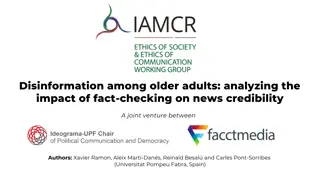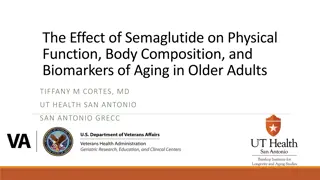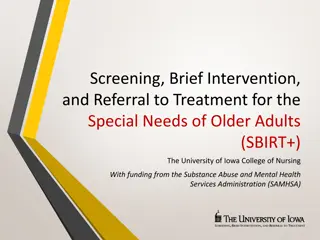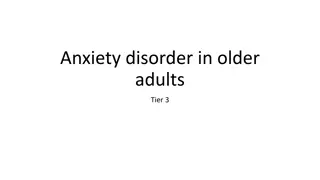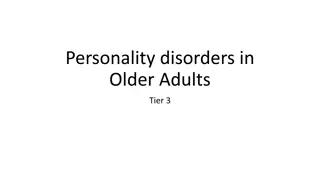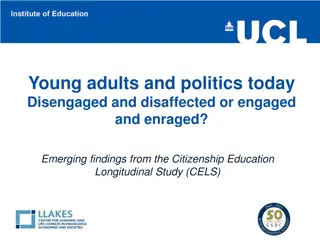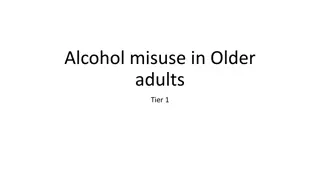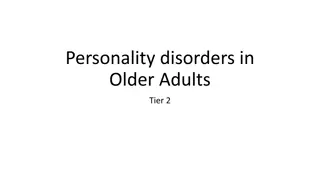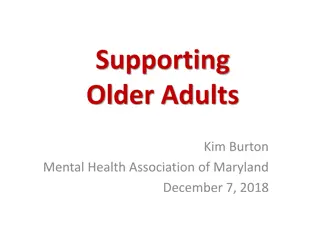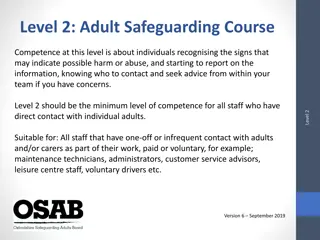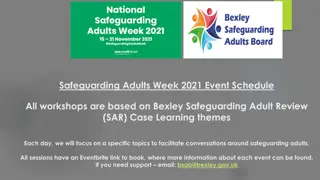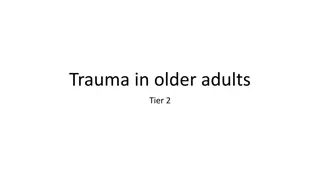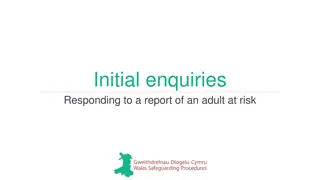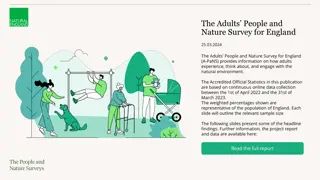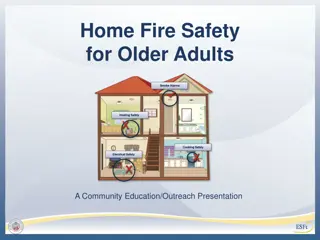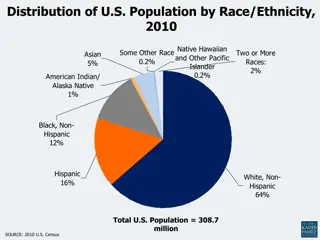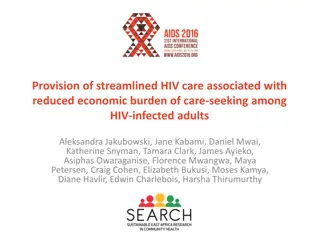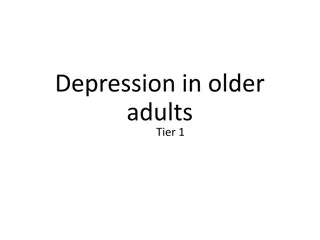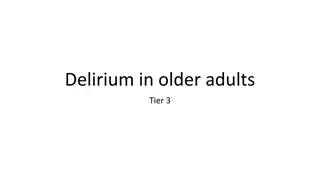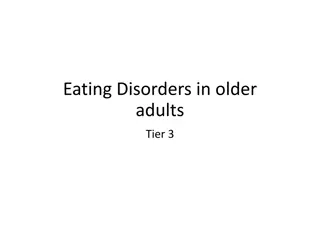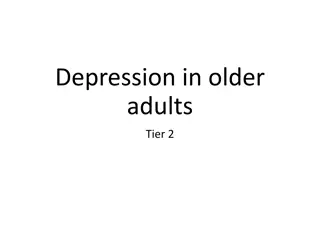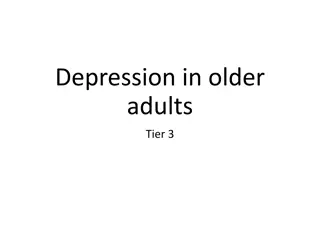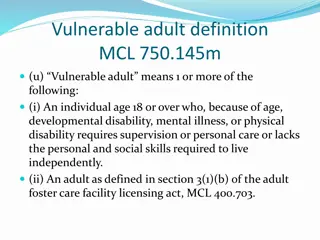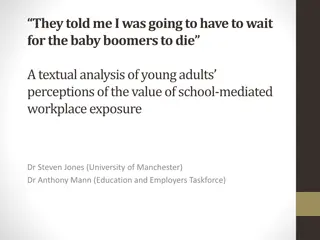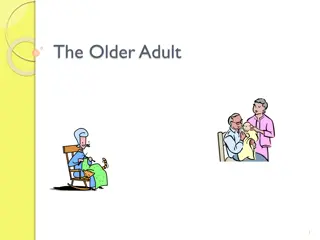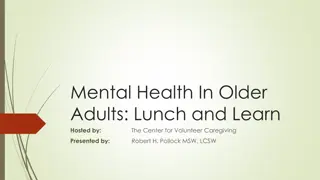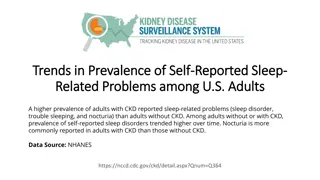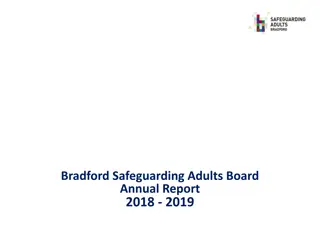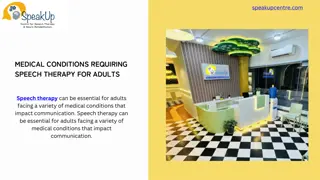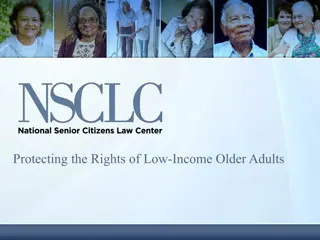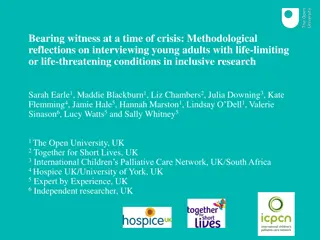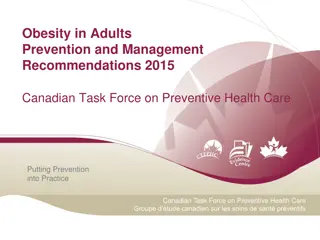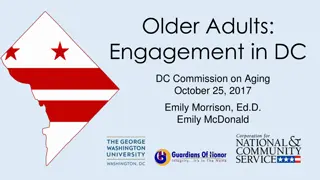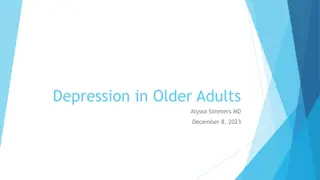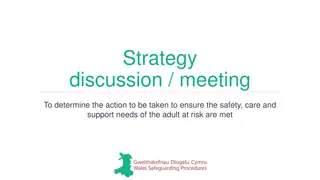Impact of Fact-Checking on Credibility Among Older Adults
Analyzing the impact of fact-checking on news credibility among older adults reveals that age is a key factor in information credibility. Older adults tend to give more credibility to various kinds of information, leading to potential challenges in discerning between true facts and false news. Fact-
6 views • 31 slides
Effect of Semaglutide on Aging Biomarkers in Older Adults
Semaglutide, a GLP-1 receptor agonist, shows promising effects on physical function, body composition, and aging biomarkers in older adults with diabetes. Studies suggest potential neuroprotective effects, improvement in skeletal muscle atrophy, and reduction in pro-inflammatory markers. Diabetes pr
0 views • 23 slides
SBIRT+: Tailoring Substance Use Intervention for Older Adults
SBIRT+ is a targeted training approach focusing on Screening, Brief Intervention, and Referral to Treatment to meet the unique needs of older adults, addressing risky substance use in the elderly population. It aims to address the growing concern of alcohol use and medication misuse in Baby Boomers
0 views • 38 slides
Anxiety Disorders in Older Adults
Anxiety disorders in older adults are prevalent but often unrecognized. These disorders can manifest alongside depression, impacting daily life. Risk factors include gender, education, health status, traumatic events, and more. Types of anxiety disorders include generalized anxiety, phobias, panic d
0 views • 17 slides
Personality Disorders in Older Adults
Personality disorders in older adults can present challenges in social functioning and relationships. Diagnosis involves assessing difficulties in maintaining relationships, controlling behavior, and listening to others. Recent personality changes may not always be due to a personality disorder but
0 views • 14 slides
Young Adults and Politics: Disengaged or Engaged?
Young adults today show a level of distrust towards politicians yet remain politically engaged, with varying concerns by gender and education. Citizenship education is seen as a positive factor in boosting engagement levels. The potential for change in the next election is promising, with a signific
0 views • 25 slides
Alcohol Misuse in Older Adults
Alcohol misuse in older adults can have serious health consequences, with harmful drinking patterns and alcohol dependence on the rise among this demographic. Aging bodies process alcohol differently, making older adults more vulnerable to its effects, including physical and mental health issues. Al
1 views • 11 slides
Safeguarding Adults: An Introduction to Adult Social Care and Responsibilities
This presentation provides an overview of eligibility criteria for adult social care and its link to adult safeguarding. It covers understanding adult safeguarding and abuse, recognizing types of abuse, and making safeguarding referrals. The Care Act 2014 sets out eligibility criteria for adult soci
0 views • 23 slides
Personality Disorders in Older Adults
Personality disorders in older adults can present challenges in living with themselves and others, affecting social functioning and relationships. Prevalence estimates suggest around 10% in older community populations, with males more commonly affected. Different types of personality disorders exist
1 views • 12 slides
Addressing Mental Health Challenges in Older Adults
Understanding the mental health challenges faced by older adults is crucial as they navigate through different stages of aging. Issues, vulnerabilities, and risk factors associated with aging can impact their well-being. From age-related vulnerabilities to under-identified and under-treated conditio
4 views • 36 slides
Changes to Joint Multi-Agency Safeguarding Adults Policy and Procedures
The changes to the joint multi-agency safeguarding adults policy and procedures in West Yorkshire, North Yorkshire, and the City of York are aimed at enhancing safeguarding practices, implementing new online pathways, and providing resources for staff updates. The focus is on safeguarding adults' ri
1 views • 74 slides
Adult Safeguarding Course Level 2 Overview
This Adult Safeguarding Course Level 2 provides competence for individuals to recognize signs of possible harm or abuse in adults. Participants learn to report information, contact appropriate individuals within their team, and seek advice. Suitable for staff with one-off or infrequent contact with
1 views • 24 slides
Safeguarding Adults and the Care Act 2014
Safeguarding adults involves protecting their right to live free from neglect and abuse by identifying risks and preventing harm. The Care Act 2014 outlines key responsibilities of local authorities in assessing adults' needs and eligibility for care and support. Legislation such as the Mental Capac
5 views • 18 slides
Safeguarding Adults Week 2021 Event Schedule
Event schedule for Safeguarding Adults Week 2021 in Bexley featuring workshops based on SAR case learning themes. The schedule includes guest speakers, thematic learning events, workshops on various topics related to safeguarding adults, and additional sessions addressing specific issues such as cul
0 views • 13 slides
Trauma in Older Adults: A Comprehensive Overview
Trauma in older adults is often under-recognized and under-treated. It can have lasting adverse effects on their well-being. Recognizing the signs, responding appropriately, and avoiding re-traumatization are crucial steps in supporting older adults who have experienced trauma. Triggers such as anni
4 views • 12 slides
Safeguarding Process for Adults at Risk
This resource outlines the safeguarding process for responding to reports of adults at risk, including making reports to social services, conducting initial checks, initiating enquiries and investigations, and making decisions on further actions. It covers key steps such as gathering information, co
5 views • 17 slides
Adults People and Nature Survey Findings in England 25.03.2024
The Adults People and Nature Survey for England (A-PaNS) provides insights on how adults in England engage with the natural environment. Key findings include 65% of adults visiting green spaces, urban green spaces being the most popular, and 65% agreeing that local green spaces are within easy walki
0 views • 14 slides
Home Fire Safety for Older Adults - Community Education Presentation
The importance of fire safety for older adults is emphasized in this community education presentation. Statistics reveal the significant risks older adults face from home fires and the leading causes behind such incidents. Strategies to reduce these risks through prevention and preparation are discu
0 views • 13 slides
Demographic Insights on Race/Ethnicity, Health, and Care in the U.S.
The data reveals the distribution of the U.S. population by race/ethnicity in 2010, highlighting percentages for Native Hawaiian/Other Pacific Islander, Asian, Hispanic, Black, White, and other groups. It also presents statistics on the distribution of Hispanic Americans, no usual source of care for
0 views • 23 slides
Impact of Streamlined HIV Care on Economic Burden among Infected Adults
Streamlined HIV care models aim to reduce the economic burden faced by HIV-infected adults by minimizing healthcare costs and improving access to care. The SEARCH trial in Kenya and Uganda implemented population-based testing and supported linkage to antiretroviral therapy (ART) regardless of CD4 co
2 views • 22 slides
Depression in Older Adults
Depression in older adults is not a normal part of aging and should not be ignored. Recognizing the signs and symptoms, such as disturbed sleep, lack of interest, and thoughts of self-harm, is crucial in detecting and addressing this condition. Presentation of depression may include agitation and pe
1 views • 13 slides
Delirium in Older Adults: Types, Causes, and Symptoms
Delirium in older adults is a complex syndrome characterized by disturbances in consciousness, attention, perception, thinking, memory, and behavior. It commonly presents as hyperactive, hypoactive, or mixed types and can be caused by various factors such as medication, infections, metabolic imbalan
0 views • 17 slides
Eating Disorders in Older Adults
Eating disorders in older adults can have serious physical and mental health consequences. Recognizing symptoms such as weight loss, phobia, and vomiting is crucial. Treatment is available, and it's important to differentiate between eating disorders and other causes of weight loss in older adults t
0 views • 10 slides
Depression in Older Adults
Depression in older adults is a serious condition that often goes undiagnosed and untreated. Recognizing the signs and symptoms, understanding the differences in presentation from younger adults, identifying risk factors, and addressing why depression is often missed are crucial steps in supporting
0 views • 15 slides
Depression in Older Adults
Depression in older adults is not a normal part of aging and should not be ignored. It is characterized by a group of signs and symptoms, including depressed mood, disturbed sleep, lack of enjoyment, reduced energy levels, and thoughts of self-harm. Older adults may present with different symptoms s
0 views • 22 slides
Risks of Financial Exploitation Faced by Vulnerable Adults
Vulnerable adults, including those with disabilities or cognitive impairments, are at risk of financial exploitation through scams like IRS fraud, family emergency scams, and healthcare insurance fraud. Elder financial abuse is on the rise, with billions of dollars lost annually. Recognizing these s
0 views • 32 slides
Importance of Employer Engagement in Education for Young Adults' Career Development
Young adults' perceptions of workplace exposure through school-mediated programs play a crucial role in their transition to the labor market. This text discusses the significance of employer engagement in education, emphasizing the benefits of work experience, career guidance, and school-age employe
0 views • 29 slides
Respecting Older Adults: Challenges and Strategies
Exploring the misconceptions and challenges faced by older adults, this content highlights the importance of combating ageism in healthcare. It emphasizes the need for nurses to overcome stereotypes, involve older adults in decision-making, and address their unique needs with respect and understandi
0 views • 21 slides
Mental Health in Older Adults: Key Insights and Strategies
Explore the complexities of mental health in older adults, covering topics such as life cycle stages, definitions of mental illness and personality disorders, elder abuse, risk factors, and interventions. Gain an understanding of the unique challenges faced by older adults in seeking help for mental
0 views • 20 slides
Trends in Prevalence of Self-Reported Sleep Problems among U.S. Adults with and without CKD
A study on the trends in self-reported sleep-related problems among U.S. adults, particularly those with Chronic Kidney Disease (CKD). The findings indicate a higher prevalence of sleep disorders, trouble sleeping, and nocturia in adults with CKD compared to those without CKD. The data suggests that
0 views • 4 slides
Bradford Safeguarding Adults Board Annual Report 2018-2019 Summary
Enriched by diversity, the Bradford Safeguarding Adults Board worked towards priorities to support adults at risk effectively. The annual report showcases accomplishments and commitments to safeguarding principles. Through partnership and community engagement, the Board aims to promote the health, w
0 views • 32 slides
Speech Therapy for Adults - SpeakUp Centre
Speech therapy can be essential for adults facing a variety of medical conditions that impact communication. SpeakUp Centre is the top-notch care for adults facing speech and swallowing disorders.
4 views • 6 slides
Advocating for the Rights of Low-Income Older Adults and LGBT Long-Term Care Consumers
The National Senior Citizens Law Center works tirelessly to protect the rights of low-income older adults through advocacy, litigation, and education. They advocate for LGBT long-term care consumers to ensure their health, economic security, and access to justice. A survey highlighted concerns faced
0 views • 18 slides
Interviewing Young Adults with Life-Limiting Conditions: Methodological Reflections
This study reflects on the methodological aspects of interviewing young adults with life-limiting conditions, emphasizing inclusive research practices. The research employs interpretive qualitative methods, focusing on unexpected consequences of pandemic control measures. Participants, including bot
0 views • 10 slides
Obesity Prevention and Management Guidelines in Canadian Adults
Over two-thirds of Canadian adults are overweight or obese, with significant weight gain occurring in adulthood. The complexity of obesity involves biological, behavioral, social, and environmental factors. The Canadian Task Force on Preventive Health Care provides evidence-based recommendations for
0 views • 46 slides
Setting Boundaries and Ensuring Safety for Students
This presentation focuses on the importance of setting boundaries and ground rules for students, covering topics such as trusted adults, keeping secrets, privacy of private parts, internet safety, and staying safe. It emphasizes the need to establish boundaries, seek help from trusted adults, mainta
0 views • 11 slides
Civic Engagement and Volunteering Among Older Adults in Washington, D.C.
Understanding the impact of civic engagement and volunteering on older adults in Washington, D.C. This study explores how older adults engage in community activities, the benefits they experience, and the reasons for emphasizing their involvement. Research highlights the importance of political part
0 views • 29 slides
Depression in Older Adults: Symptoms, Risk Factors, and Treatment Options
Depressive symptoms in older adults are common but often go unrecognized. While depression is not a normal part of aging, older adults may exhibit a variety of depressive symptoms. Risk factors include pain, isolation, insomnia, medical comorbidities, and more. Classification includes Major Depressi
0 views • 38 slides
Saakshar Bharat: Empowering Adults through Functional Literacy
Saakshar Bharat is a centrally-sponsored scheme in India aimed at promoting adult education, with a focus on women, by providing educational opportunities to those who have missed out on formal education. Launched on International Literacy Day in 2009, the program targets non-literate adults in the
0 views • 14 slides
Ensuring Safety and Support: Strategy Discussion for Adults At Risk
In strategy discussions and meetings, actions are determined to ensure the safety, care, and support needs of adults at risk are met. These meetings involve sharing information, creating protection plans, assessing risks, specifying roles, considering wishes of the adults at risk, completing assessm
0 views • 11 slides
